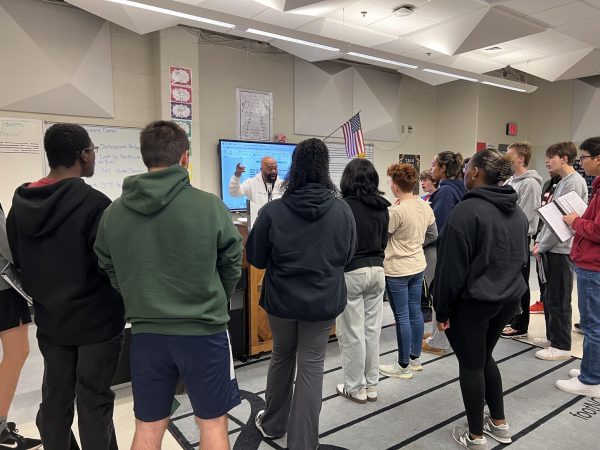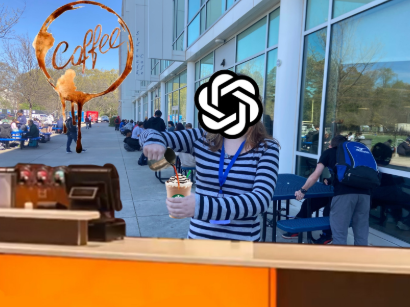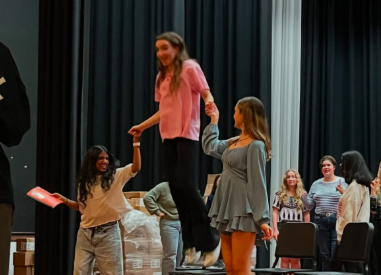Drama I
If you’re searching for the perfect elective to have a creative outlet, then look no further than Drama I. Drama I is a class that introduces students, primarily freshmen, to theater. Participation in this class can be followed by the Musical theater pathway. The class is taught by Timothy Simmons, a new addition to the Chamblee staff, who also teaches chorus and musical theater.
“It’s really fun, and you get to find a sense of self,” said Aria Cates. “We do a lot of different acting exercises like mirroring and stuff like that.”
Drama class is a relatively easy course to take according to Sophia Harp (‘28), with the main difficulty being the class’ focus on group work.
“I don’t think the class is difficult,” said Harp. “I think it’s more trying to learn how to work with people.”
This class focuses on the “basics of acting” according to Katie Mogilski.
“You learn a lot about different styles of acting, how to approach the whole business and the history of it,” said Mogilski. “It’s just an overall fun and creative class.”
Students should be warned, though, that they will terribly upset if they sign up for this class thinking it will be a free period because participation is a huge factor in the grading system.
“You’re graded on participation every day. So if you raised your hand, you participated in the exercises, it’s mainly that,” said Cates. “If you participate, yeah, [it’s an easy A]. If you sit down on your phone every day it’s not gonna work out.”
Because of this, one should only sign up for this class if they have enthusiasm for the subject.
“I mean if you think you’re interested in theater, do it, but if you’re not interested in theater don’t do it as like an easy class because it’s a lot of stuff,” said Rosemary Cochran.
While it may be a lot of “stuff” the work is generally fun and engaging, with tasks ranging from “scenes and monologues” to improv. This class is also a great way to meet other students who share the same interests.
“The best part of the class is meeting new people, bonding with them, and then performing with them,” said Lucy Samuels.
The course load consists mainly of “memorization quizzes and mini-scene writings,” but it is nothing a dedicated student can’t handle, and by some was even described as “light.”
“It’s a perfect balance. I never worry about the class even with all my other core classes,” said Samuels. “You definitely have to put some hard work in, but it’s fun work!”
Musical Theater I, II, and III
After Drama I, students can continue into Musical Theater. All three of these courses are currently taught at the same time and follow the same curriculum. Mary Bell (‘25) is currently taking Musical Theater and thoroughly enjoys the class.
“You really get to make a lot of friends, because we all get to work together on different projects,” said Bell. “You get to develop your confidence in public speaking so it’s very beneficial.”
Camden Harris (‘26) also takes musical theater but was not prepared for how much more singing was done over the acting aspect of musical theater.
“It’s not a hard class, it’s just very singing-oriented,” said Harris.
Timothy Simmons, who teaches the class, is new to teaching and directing theater. Students like Harris feel like he’s overshadowed the acting part of musical theater and focused on singing. However, other students have different views on Simmons’s teaching of musical theater.
“I consider musical theater to be much more theater-based as opposed to all of Mr.Simmons’ other classes,” said Sela Sokol (‘27). “He’s done a good job incorporating more theatrical aspects into this class even though he may not be used to teaching this form of performance.”
Beginning Mixed Chorus
Beginning Mixed Chorus is the starting point for Chamblee’s chorus program and is great for anyone who wants to start out singing in a chorus. Even if you don’t have prior experience, beginning mixed chorus is open to everyone.
“I think it challenges you, but I don’t think it’s that difficult,” said Ava Smith (‘25). “ Inside of class, it’s just singing and practicing sight singing. [Simmons] helps students read the music and determine their own pitches.”
Simmons is very well experienced in teaching chorus to all levels, so he does well teaching all levels.
“I would recommend it if you want to do chorus,” said Leslie Lopez Albores (’28).
Advance Treble Chorus
Treble Chorus is the chorus option for students with a treble vocal range. Many students refer to it as Advanced Women’s Chorus, however, the official name is Advanced Treble Chorus. Because it is advanced, students looking to take this course should have a background in singing in a chorus.
“I recommend it if you know music,” said Sydney McMillan (‘27). “If you don’t know music, you gotta learn from the bottom up.”
The workload is fair, mainly consisting of sight singing and occasional quizzes and there is an additional commitment for performances outside of school.
“Adv women’s chorus can be difficult at times whether it be communicating with others and the teacher or the challenges with learning new pieces of music,” said Sofia Briceno (‘27). “Performances can also be difficult at times due to lack of joint rehearsal but we all do our part to make sure it goes smoothly.”

Tenor/Bass Chorus & Advanced Mixed Chorus I
This year, Simmons teaches both the intermediate tenor/bass chorus and advanced mixed chorus during the same period. Both of the classes are given the same songs, the only difference is that the students sing according to their vocal range.
“If you’ve been in chorus for a while it’s just singing,” said Skyler Schwartz (‘25). “A lot of the work is done in class. You learn how to sing a bunch of different songs. We’re doing Christmas songs right now. Otherwise, it’s just a lot of traditional choral stuff.”
The class is overall enjoyable and it is rewarding to see the work you’ve put in during class reflected during performances.
Beginning Band
Beginning Band is the starting point of getting into the different bands in Chamblee. It is open to students continuing from middle school or students who have never played before and want to start. Jake Shankman (‘28) enjoys the class and recommends it to anyone considering.
“Band is super fun. It’s an awesome community and Ms.Marin is amazing,” said Shankman. “Plus, it can connect you to other communities, like marching band.”
Colleen Marin is the band teacher in charge of the band classes at Chamblee. Many students credited Marin to their enjoyment of the class.
“I really love Mrs.Marin’s teaching style,” said Kiran Richardson (‘28), who recommends the class to anyone interested.
Students are expected to put in good work in class and practice outside of class, but other than that the workload is very light.
“Definitely, you need practicing outside of class,” said Richardson. “We also have a final project that we are expected to practice.”
Percussion Ensemble
Percussion Ensemble is a band class currently exclusively during first period and it is meant to highlight percussion instruments, using no wind instruments.
“Percussion Ensemble is a fun class. It’s definitely different from other band classes where you get to fully experience all of the different percussion instruments rather than playing only with the band. You get solos as well as entire group pieces that your friends can play,” said Mateo Hunter (‘23).
The class has no prerequisites and encourages those who have never played percussion before to join.
“The class goes from beginner percussionists all the way to people who have been in percussion for years. I’ve played for seven years, but in percussion [ensemble], everyone has a job and we’re all able to work together and produce music only through percussion instruments, which is pretty cool, being that normally we only play with the band,” said Hunter.
The class allows students to learn skills for every percussion instrument at Chamblee, and they often rotate around to different parts on different songs.
“You get to learn how to drum as well as how to do mallets and then pretty much everything that a percussionist can do you’ll touch on, which is pretty cool because then you can take those skills and use them later,” said David Artigue (‘25).
It also gives percussionists a chance to shine on their own, not behind the band.
“I only used to play the easy parts, but now since there’s more focus on me, Mrs. Marin helped me get better and she encourages me to do harder parts and it’s actually good because I learn more things,” said Sai Akshat Chitta (‘25).
Students in the class say you should be prepared to begin the day actively playing, but that it’s a fun and relaxed environment. “Every day you learn more. You just just go in and learn and just play and have a good time,” said Larry Smith (‘22).
Students generally don’t consider the class an easy, free period since you have many instruments and songs to learn. “It’s like a real class,” said Jackson Smith (‘23). The class involves solo assignments to improve outside of ensemble work, as well as group pieces.
“I think if someone is interested in the class, they should try it. It’s a great way to start my day. […] You actually have to put in work. We play different pieces in little ensembles, and everyone in the ensemble is counting on everyone else in that ensemble to learn their part and learn it correctly. […] If you’re just looking for a free class to take, don’t take percussion ensemble,” said Phinn Adams (‘22).
Guitar Class
One of the many musical arts classes offered at Chamblee is guitar class. This is taught by orchestra director Philip Barnard, where students with little to no experience with instruments can learn how to read music and play the different chords on a guitar.
As for the workload, it may be a bit much for students who play a sport or have lots of extracurriculars.
“We do have to practice at home, and we usually have to perform one whole song by Friday,” said James Morton (‘25).
However, Morton also mentioned that as long as you pay attention, it’s a light class.
“It is very fun to take because of how easy it is,” said Morton.
AP Music Theory
For students that have a love for music and want to understand the logic that goes into composition, AP Music Theory might just be the perfect class because students, as described by Kendall Young, get to “[learn] the fundamentals of how music is written and how to analyze written music in the best way possible.” The class focuses mainly on composition rules, but also the exemptions to these rules, and “why and how they [composers] deviate from these standards.” As a project, the students get to show off their newly acquired knowledge by composing their own original pieces.
The students that chose to take this class generally had a long history already with music. For example, Nicholas Osselette took it because he “wanted to better my knowledge,” whereas Samantha Hopper wanted the chance to take a class that would be different from the rest of her schedule.
“I knew that I wasn’t going to get a lot of opportunities in the future to get to just learn something that was interesting to me,” said Hopper.
The general consensus of students in the class is that you should only take this class if you are willing to put in the work.
“If you’re considering the class then I would take it because it’s like a good way to expand your knowledge of music so you can sound better while playing,” said Kendall Young. “But if you just want to take it for your friends that are in it, then don’t do it because it’ll be really hard, and you won’t like it.”
There is a lot of work for the class and can take up a lot of time in the afternoon.
“I would recommend it to people with very light workloads who have lots of time to dedicate to the class because you have to work on it at least two hours a day, especially training your ear,” said Alexandra Jepson. “If you have perfect pitch, I’d take it but if you don’t, then I’d rethink it.”
The reason perfect pitch is helpful for this class is because they often have “oral quizzes” in which they must identify three chords being played for them.While there are a lot of assignments that go along with this class, all that take it are happy that they did, and feel that getting an A is quite possible.
“I’d say it’s an easy A if you do you’re homework. If you don’t do your homework, you’re not gonna learn the content and it’s gonna suck,” said Hopper. “The 45% category is mostly completion work, so you’re homework, so it’s not that bad.”
Orchestra
Orchestra is a performing arts elective class at Chamblee, taught by Philipp Barnard. Students of all musical levels are welcomed, although most students in the class began learning their instruments prior to coming to Chamblee. It has multiple levels to fit students’ skill levels and can be used, like band and chorus, to receive a fine arts diploma seal when graduating.
“It’s fun to play music and it’s fun to take your mind off grades and other classes,” said cellist Eli Ritchey (‘25). “ It’s just fun to get your mind off things in other classes and tests.”
Students in orchestra have outside of class perks like concerts and trips to other cities, which aid in their learning and give them a chance to play outside the normal school day. These music trips in the past have been in collaboration with band and chorus to places like New York City.
Most students’ favorite part of the class is the concerts, which allows them to show off their music. “[My favorite part is] the end result because you’ll be practicing a piece for like a couple of months and then perform it at a concert and you can see how far you’ve come,” said Abdulahi.
The typical day in class has a set routine. “We come in, we tune, sometimes we practice technical skills, and then we just play music,” said Ritchey.
Orchestra also gives the students lots of opportunities outside the class, like a musical honor society, but also inside the class. “I like how we have a senior in the class. She conducts the orchestra; she’s kind of like a second teacher,” said violinist Anya Gant (‘25).
The class has little work outside the student’s own interest and time commitment in their instrument. “We just practice. So that’s really your only homework,” said violin player Ladon Abdulahi (‘24).
The classroom environment is described as “quiet, yet it can still be rowdy at times,” by bassist Andrew Cole (‘24).
The students love “Mr. B because he’s very nice and funny and he doesn’t like to scold us. Even if we’re bad, he encourages us to be better,” said Abdulahi.
According to Ritchey, when involved in orchestra, you should “just have fun. Enjoy it.”






